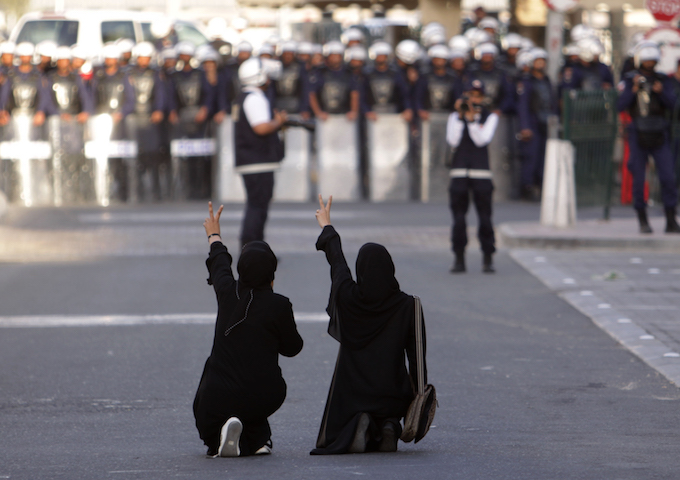The Government of Bahrain has targeted numerous internationally renowned human rights defenders in reprisal for their work. Many, including Nabeel Rajab and Abdulhadi al-Khawaja, are known around the world, with their cases documented by human rights organizations, governments, and the United Nations. However, the Bahraini government’s attack on peaceful dissent and opposition has cast a wide net, capturing scores of “ordinary people” whose names are rarely, if ever, shared widely. Americans for Democracy & Human Rights in Bahrain (ADHRB) is launching the new series Profiles in Persecution in the hope of changing that. In each installment, the series will profile a different Bahraini citizen and tell their story, revealing some of the countless men and women who have found themselves targeted, arrested, tortured, and imprisoned by their government in response for their activism or political beliefs.
The overarching aim of Profiles in Persecution is to illustrate the true breadth of human rights violations committed in Bahrain. Though the government undoubtedly targets the country’s high-profile activists, Bahraini authorities also regularly punish ordinary people for deciding to speak their minds. Profiles in Persecution will call attention to the scores of Bahraini citizens attempting to peacefully challenge repression and to secure their basic human rights – often at great risk.
ADHRB additionally hopes that this series will encourage readers to see themselves in the stories and lives of ordinary Bahrainis who have sought to peacefully bring about change in their country. The more that others are exposed to accounts of the Bahraini torture survivors and prisoners of conscience, the harder it will be for Bahrain’s key international allies to ignore such behavior. In this way, Profiles in Persecution seeks also to promote solidarity and urge the international community to hold the Bahraini authorities accountable for the severe human rights violations they continue to perpetrate.
Najah Ahmed Yusuf
Najah Ahmed Yusef is a 40-year-old Bahraini mother of four, who works as a state employee at the Labour Market Regulatory Authority. On 20 April 2017, the Muharraq security office summoned Najah to accompany her 14-year-old son on Sunday 23 April 2017 to an interrogation on “illegal gathering” and alleged rioting. On Sunday, Najah appeared with her son at the Muharraq security office.
After her son’s interrogation, Najah was also interrogated and accused of working with a terrorist organization in Iran and Iraq. She denied any such affiliation, but the security officers ignored her protests and demanded she work with the state as an informant. To compel her to cooperate, the security officers promised her job security and the release of her 17-year-old son from prison. Najah had only two choices: to work with the state and provide information on people she did not know or to confess to the false accusations. The officers asked Najah to return the next day with her answer.
On Monday 24 April, Najah returned to the security office and refused their offer. As a result of her refusal, she was beaten. She was asked about her supposed relationships with escaped prisoners, and about the organizers and funders of political activities in her village. Najah did not know the people she was asked about, and could not provide an answer to their questions. As a result, she was beaten more violently and sexually assaulted. The security officers threatened to rape Najah and threatened to kill her or one of her family members by staging an accident. The interrogation continued for a total of eight hours, after which she was released and told to return the next day.
For the next two days, the torture continued with the interrogations lasting approximately seven or eight hours. At the end of the interrogation on Wednesday, the security officers told Najah to go home and return on Thursday. Unwilling to go on with the routine of daily torture and interrogation, she refused to leave the security office just to come back the next day for more abuse. The security officers called Najah’s husband to pick her up from the office and told him they only wanted her to come to the office on Thursday to sign a pledge not to engage in political activities or interact with certain people. The officers promised that after signing the pledge they would let her go home in peace. Wanting to believe her ordeal was over, Najah agreed to go home for the night.
On Thursday Najah went with her husband to the security office as demanded. However, there was no pledge for her to sign. Instead, the security officers requested that she sign several prepared confessions to false charges. When she refused, she was transferred to the Office of Public Prosecution. At 9:00 p.m. that night, Najah informed her husband and lawyer that she had been transferred to the women’s detention center in the town of Isa.
On 25 May 2017, Najah was taken to court without any prior notice. She was asked to plead guilty to various false charges, but she denied all of them and the hearings were adjourned until 11 June 2017.
At the hearing on 11 June 2017, Najah’s attorney was denied any information on the charges against his client. He was not able to meet or see Najah, but was informed that her detention had been extended to 30 days, rather than the two weeks that Najah had been told. Counting from the date of her initial detention, 27 April, Najah is now on her 68th day of detention (as of 3 July). This means she has been held beyond the maximum allowable period of “preventive” pre-trial detention under Bahraini law. Najah has not been allowed to see her 17-year-old son who is also in prison, and she is only allowed one phone call per week for no longer than five minutes. The case file still has not been given to Najah’s attorney.





